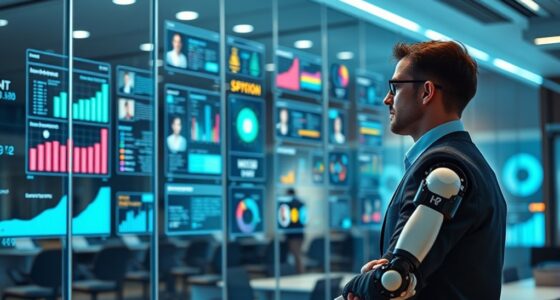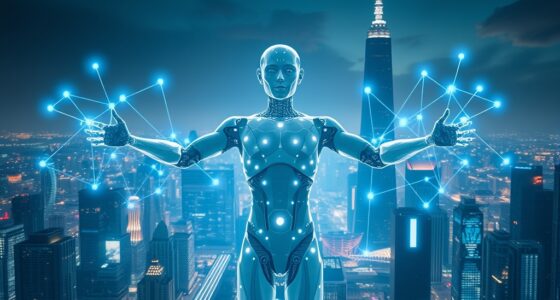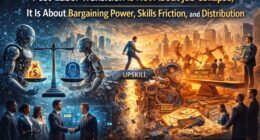Jobs that rely on empathy, moral judgment, and complex human interactions are tough for automation to replace. Roles like therapists, counselors, artists, and coaches depend on emotional intelligence, intuition, and trust-building—skills machines haven’t mastered. Positions involving ethical decisions, cultural nuance, and unpredictable situations also require human judgment. If you want to understand which careers are most resilient and how to stay ahead, the key insights await you below.
Key Takeaways
- Professions requiring genuine empathy and complex moral judgment, such as counseling and coaching, are difficult to automate.
- Creative and interpersonal careers like arts and cultural work depend on emotional intelligence and adaptability, resisting automation.
- Handling unpredictable, ethically complex situations—such as judges or crisis negotiators—necessitates nuanced human judgment.
- Human-AI collaboration roles in healthcare and data analysis leverage emotional intelligence, making full replacement unlikely.
- Developing skills like empathy, moral reasoning, and adaptability is essential for job resilience amid automation advances.
Top picks for "human touch jobs"
Open Amazon search results for this keyword.
As an affiliate, we earn on qualifying purchases.
Professions Dependent on Empathy and Emotional Intelligence

Professions that rely on empathy and emotional intelligence remain largely resistant to automation because they require nuanced human interactions that machines can’t replicate. As a caregiver, counselor, or social worker, you understand that genuine connection, understanding, and emotional support can’t be programmed. These roles demand sensitivity to subtle cues like tone, facial expressions, and body language—things machines struggle to interpret accurately. Your ability to adapt to individual needs, offer comfort, and build trust is irreplaceable. Machines may handle data or perform repetitive tasks, but they lack the capacity for compassion and emotional nuance essential in these careers. Your skills foster meaningful relationships, which are central to effective care and support, making your profession inherently resistant to automation. Additionally, the importance of emotional support in maintaining mental and emotional well-being underscores why these roles are uniquely human.
Creative and Interpersonal Careers That Defy Automation

You can’t replace jobs that rely on emotional intelligence, creative problem solving, or human connection. These careers require qualities like empathy, intuition, and the ability to adapt to complex social situations. That’s why roles in counseling, coaching, and the arts remain resistant to automation. Additionally, understanding divorce guidance can help professionals in these fields better support clients navigating personal transitions.
Emotional Intelligence Roles
Because emotional intelligence is at the core of many creative and interpersonal careers, these roles stand out as some of the least vulnerable to automation. Your ability to connect, empathize, and adapt makes you indispensable in fields like counseling, social work, and coaching. AI may handle data, but it can’t replicate genuine human understanding or emotional nuance. These roles require active listening, empathy, and real-time judgment—traits machines haven’t mastered. Consider the following:
| Role | Key Skill | Automation Resistance |
|---|---|---|
| Mental health counselor | Empathy, active listening | High |
| Social worker | Emotional support, judgment | High |
| Career coach | Personal insight, motivation | High |
Your human touch remains irreplaceable in nurturing trust and guiding others through complex emotions.
A strong foundation in emotional intelligence enhances your ability to succeed in these roles, ensuring that human connection remains vital amid technological advances.
Creative Problem Solving
Creative problem solving thrives in careers where innovation, adaptability, and interpersonal skills are essential, making them highly resistant to automation. You excel when navigating complex situations that demand fresh ideas and flexible thinking, qualities machines struggle to replicate. Whether you’re designing marketing campaigns, developing new products, or strategizing solutions for unique challenges, your ability to think outside the box is invaluable. Collaboration plays a key role, as bouncing ideas off others sparks innovation that automation can’t easily generate. Your intuition and emotional insight help you understand nuanced human needs, crafting tailored solutions. These roles rely on your capacity to adapt quickly, interpret ambiguous information, and communicate effectively—traits that ensure your work remains essential despite technological advances. Additionally, your understanding of complex systems and safety procedures further distinguishes human professionals from automated solutions.
Human Connection Skills
While problem-solving skills drive innovation, careers that rely heavily on human connection and interpersonal abilities stand out as particularly resistant to automation. You excel in understanding emotions, reading subtle cues, and building trust—skills AI struggles to replicate. Roles like therapists, social workers, and coaches depend on empathy and genuine human interaction that machines can’t mimic effectively. Creative professionals such as choreographers and artists rely on intuition, personal expression, and cultural context, making their work uniquely human. Your ability to connect, motivate, and navigate complex social dynamics remains irreplaceable. As automation advances, these roles will grow in importance, emphasizing emotional intelligence and relationship-building—traits that only humans can authentically provide, ensuring your relevance in an increasingly automated world. Additionally, user privacy considerations highlight the importance of trust and ethical engagement in human-centered careers.
Complex Decision-Making Roles Resistant to AI

You rely on human judgment every day to make nuanced decisions that machines can’t easily replicate. Ethical considerations and handling unforeseen situations require a level of intuition and moral understanding AI simply can’t match. These complex decision-making roles remain resistant to automation because they depend on your ability to evaluate context and adapt on the spot. Additionally, the anti-aging effects of certain skincare methods demonstrate the necessity of personalized assessments that AI cannot fully provide.
Human Judgment in Practice
Complex decision-making roles that rely on human judgment remain largely resistant to AI because they require nuanced understanding, ethical considerations, and adaptable problem-solving skills that machines struggle to replicate. You need to interpret subtle social cues, assess moral implications, and adjust strategies based on unpredictable variables. These roles demand flexibility—what works in one context may not in another—something AI currently cannot handle well. You bring experience, intuition, and ethical awareness that guide complex choices, especially when data is incomplete or ambiguous. For example, senior managers, judges, and crisis negotiators use judgment rooted in human values and contextual awareness. Machines can process data, but they lack the emotional intelligence and moral reasoning necessary for these high-stakes, multifaceted decisions. Additionally, home improvement requires a nuanced understanding of individual needs and preferences, which AI cannot fully grasp.
Ethical Decision-Making Skills
Have you ever considered why ethical decision-making remains difficult for AI to replicate? It’s because ethical choices often involve complex moral judgments, cultural nuances, and emotional awareness that machines lack. AI can process data and follow programmed rules, but it struggles with context, empathy, and understanding human values. When faced with dilemmas—such as balancing safety, fairness, and individual rights—you need intuition and moral reasoning that adapt to unique situations. Human decision-makers consider societal norms, personal morals, and emotional impacts, which are difficult to encode into algorithms. This capacity for nuanced judgment makes roles requiring ethical decision-making inherently resistant to automation. You bring a moral compass that guides choices beyond what data alone can provide, preserving the essential human element in sensitive situations. Additionally, the personal development industry emphasizes cultivating qualities like empathy and self-awareness, which are crucial for ethical reasoning.
Handling Unpredictable Situations
Handling unpredictable situations requires more than just following established protocols; it demands swift judgment, adaptability, and nuanced understanding. You need to assess rapidly changing variables and make decisions that balance safety, ethics, and practicality. Unlike automated systems, you can interpret subtle cues, emotional nuances, and context-specific details that influence outcomes. Your ability to think creatively and improvise under pressure is vital when plans fall apart or new challenges emerge unexpectedly. AI struggles with ambiguity and situations that require moral reasoning or emotional sensitivity. In roles like emergency responders, managers, or healthcare providers, your capacity to adapt on the fly ensures effective solutions. This human skill set remains irreplaceable because machines can’t yet replicate the complex, real-time judgment you bring to unpredictable circumstances.
The Growing Need for Human-AI Collaborative Jobs

As AI technology advances, the demand for jobs that blend human skills with machine capabilities is increasing rapidly. You’ll find new roles emerging that require managing, interpreting, and collaborating with AI systems. For example, AI specialists, machine learning engineers, and data analysts work alongside automation tools, enhancing productivity and decision-making. In healthcare, roles like nurse practitioners and counselors rely on empathy and nuanced judgment, often supported by AI-driven diagnostics or patient data analysis. These jobs demand a combination of technical expertise and emotional intelligence. You’ll need to adapt by developing skills in digital tools, data management, and interpersonal communication. This synergy between humans and AI isn’t just a trend; it’s shaping the future of work, emphasizing collaboration over replacement. Additionally, understanding Vetted – Halloween Product Reviews can help professionals in retail and marketing develop better customer engagement strategies in the evolving AI landscape.
Socioeconomic Factors Shaping Job Vulnerability

Socioeconomic factors play a crucial role in determining how vulnerable different jobs are to automation. If you hold a low-skilled position, you might think you’re safe, but many such jobs are declining as automation advances, especially in high-income countries. Conversely, workers with higher education or specialized skills tend to face less risk because their roles involve complex judgment and emotional intelligence that machines can’t replicate. Access to education, digital literacy, and ongoing training substantially influence your job security. Economic disparities also matter; workers in wealthier nations experience higher automation risks due to advanced technology adoption. Age and experience shape how you perceive and face these changes—older workers may have fewer opportunities to adapt. Overall, socioeconomic status directly impacts your vulnerability to automation and your ability to transition into resilient roles. Additionally, philosophical insights on ethics and human authenticity can inform how society approaches the adaptation process and values human-centered work.
Skills and Strategies for Thriving Amid Automation

To thrive in an increasingly automated job market, you need to develop adaptable skills and adopt proactive strategies. Focus on honing your emotional intelligence, creativity, and problem-solving abilities—areas AI struggles to replicate. Invest in continuous learning, especially in tech-related fields like data analysis, programming, or AI management, to stay relevant. Build strong interpersonal skills that foster collaboration, empathy, and trust, which are crucial in roles requiring human judgment. Embrace flexibility by diversifying your skill set and being open to new opportunities. Network actively to stay informed about industry shifts. Finally, develop a growth mindset, viewing change as an opportunity to evolve. By staying adaptable and proactive, you’ll enhance your resilience and secure an essential role in the future workforce.
Frequently Asked Questions
How Will AI Influence the Future of Human-Centered Professions?
AI will shape your future in human-centered professions by enhancing your ability to focus on emotional intelligence, creativity, and complex judgment. While routine tasks may get automated, your skills in counseling, nursing, and social work will remain essential. You’ll work alongside AI tools, using them to improve outcomes and efficiency. Staying adaptable and continuously upskilling will be vital, ensuring your role continues to provide the human touch that technology can’t replicate.
Can Emotional Intelligence Be Effectively Taught or Enhanced in Workers?
You can definitely teach and improve emotional intelligence in workers. Remarkably, research shows that emotional intelligence can increase through targeted training, with some programs boosting empathy and social skills by up to 25%. By focusing on active listening, self-awareness, and empathy exercises, you help workers develop these essential skills. Continuous practice and feedback are key, making emotional intelligence a learnable trait that enhances interpersonal effectiveness and resilience in the workplace.
What Industries Are Most Likely to See Job Growth Despite Automation?
You’ll see job growth in industries like healthcare, especially roles like nurse practitioners, counselors, and therapists, where emotional intelligence and human interaction are essential. The green economy is also expanding, creating opportunities in sustainable farming and food processing. Additionally, jobs involving AI management, such as data specialists and machine learning engineers, are rising. These sectors thrive because they rely on human skills that automation can’t easily replicate, ensuring continued growth despite technological advances.
How Can Workers Prepare for Shifting Roles Due to AI Advancements?
You should focus on upskilling in areas like AI management, data analysis, or healthcare, as these jobs grow despite automation. Nearly 47% of U.S. workers face roles threatened by AI, so adapting is crucial. Embrace continuous learning, gain new tech skills (like Python or SQL), and stay informed about market trends. Developing emotional intelligence and interpersonal skills will also make you more resilient in roles where human touch remains essential.
Will Automation Lead to Increased Job Polarization and Economic Inequality?
Automation will likely increase job polarization and economic inequality. You might find low-skilled jobs declining as machines take over routine tasks, while high-skilled, specialized roles grow. This leaves middle-income workers vulnerable, widening the income gap. To stay ahead, you should focus on developing skills that complement AI, such as emotional intelligence, creativity, and complex problem-solving. Upskilling now can help you adapt and reduce the risk of falling behind in a changing job market.
Conclusion
While automation advances rapidly, jobs relying on empathy, creativity, and complex judgment remain resilient—at least for now. Some believe that human connection and emotional intelligence are uniquely ours, making them harder for AI to replicate. But as technology evolves, staying adaptable and honing your interpersonal skills can keep you ahead. Trust me, embracing these qualities might just be your best bet to thrive in the changing job landscape.









